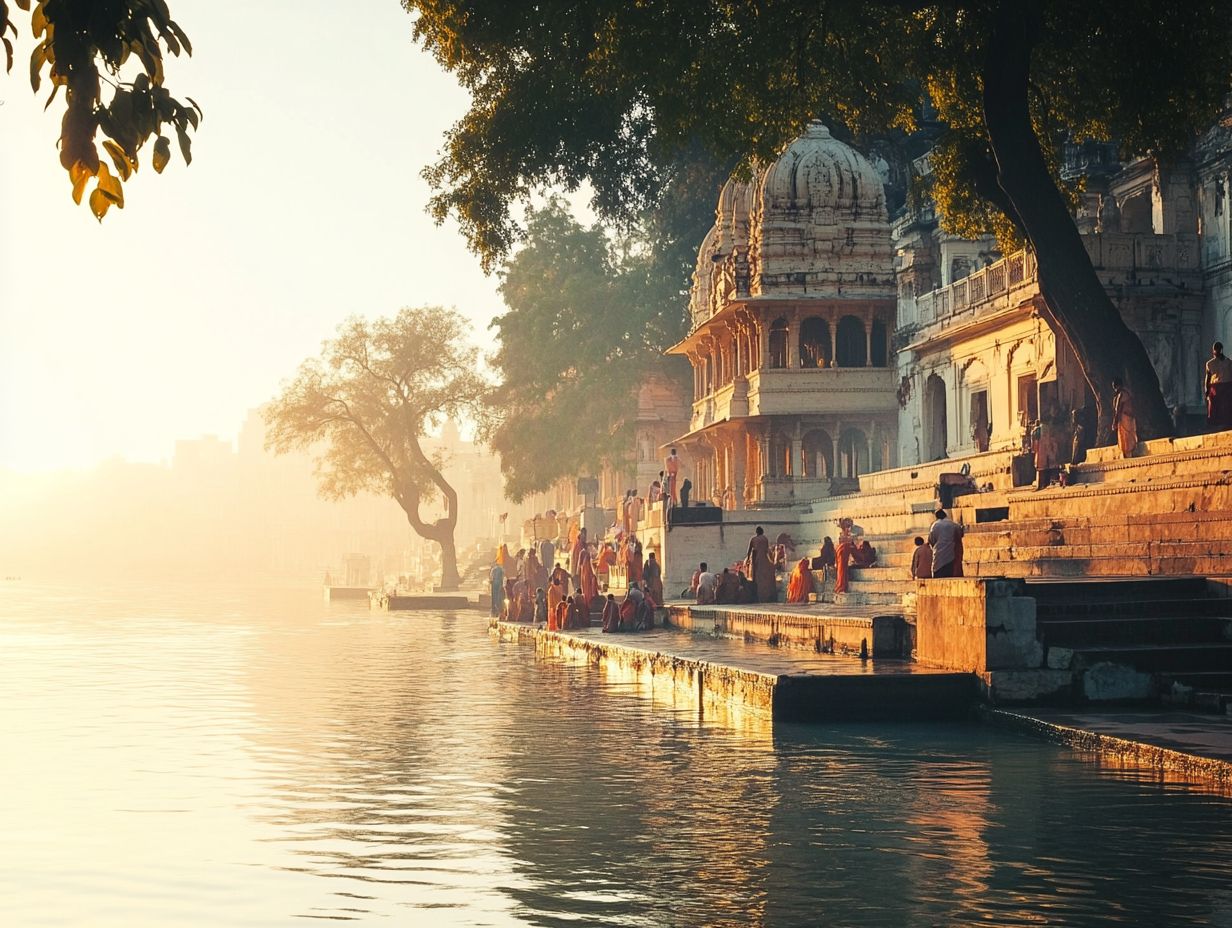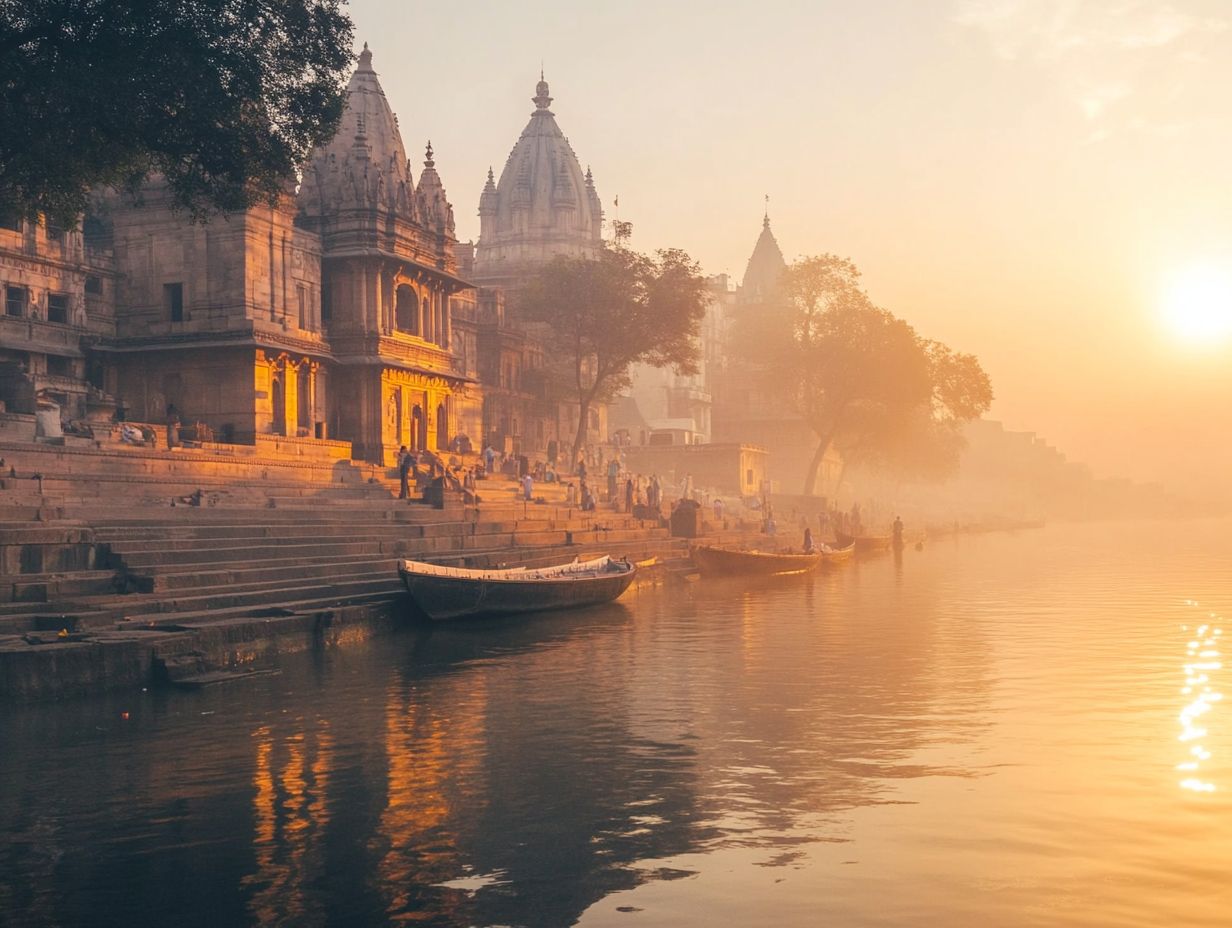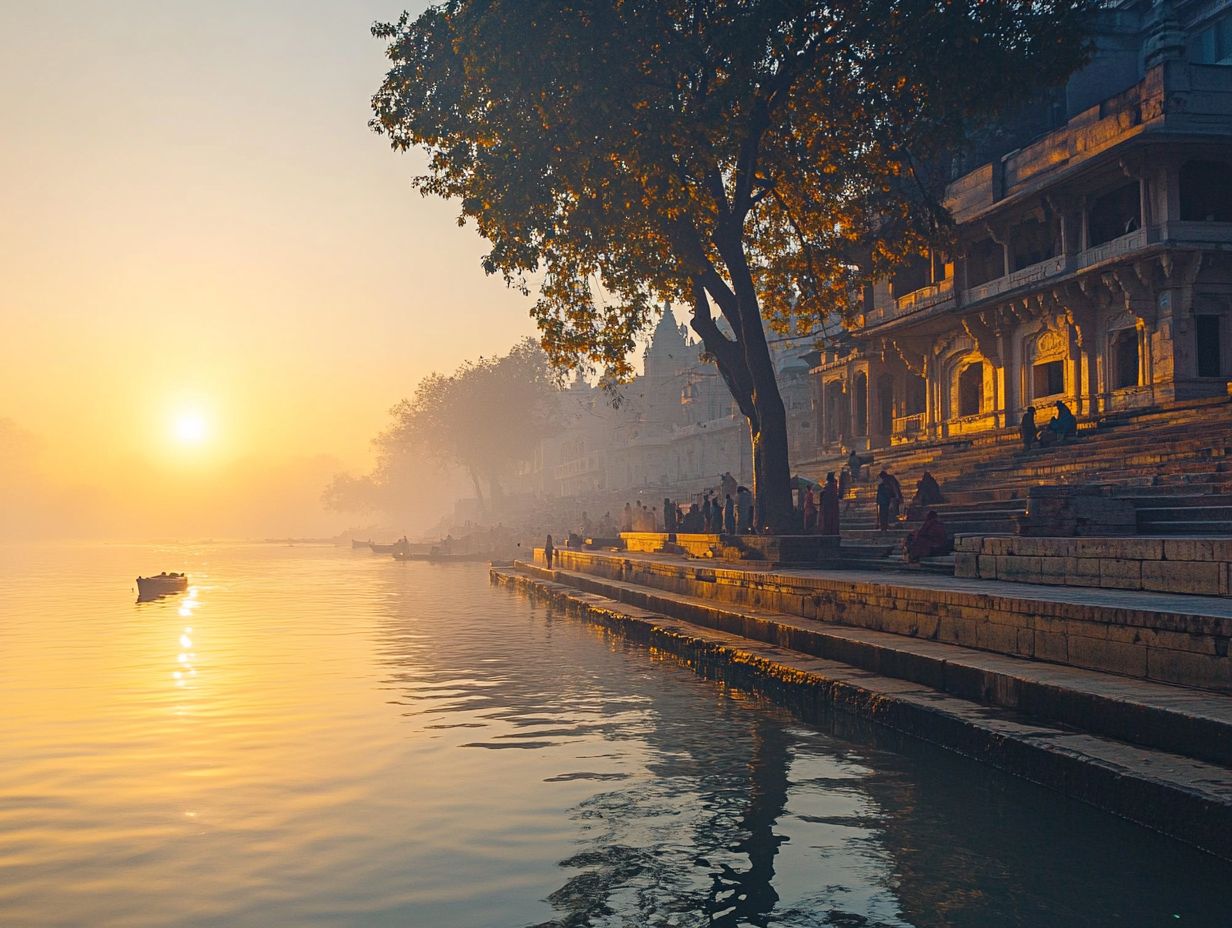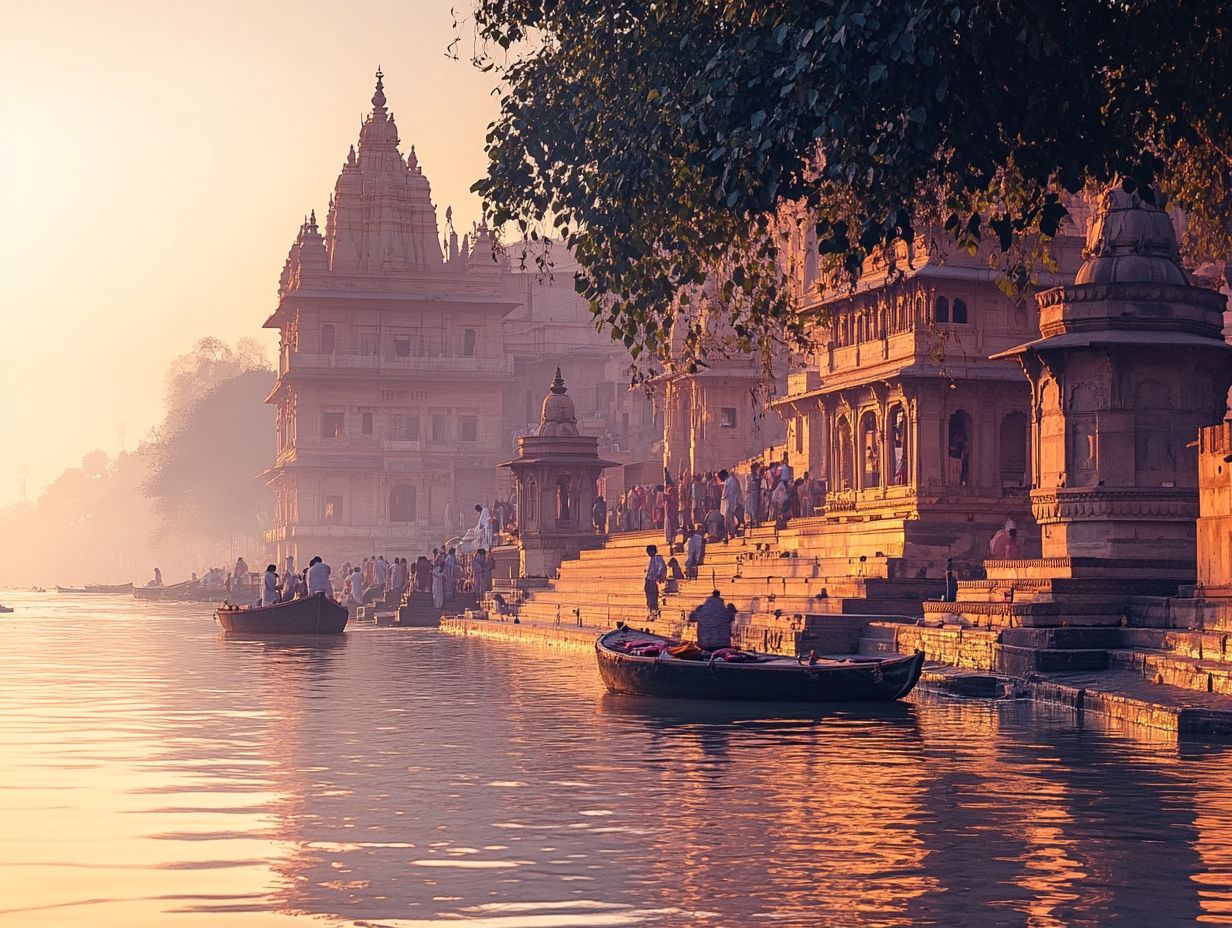In Which Modern Country Did Hinduism Begin?
Hinduism, recognized as one of the world’s oldest religions, presents a rich tapestry of beliefs, rituals, and philosophies that have evolved over millennia. This exploration delves into the origins of Hinduism, tracing its historical roots and the significant events that have shaped its development, including the influence of sacred texts like the Vedas and Upanishads and practices such as yoga and meditation.
The piece examines the geographical locations that fostered this vibrant faith, detailing its spread across the globe and the core beliefs and practices that characterize it today, including the worship of Hindu deities, the significance of sacred rivers like the Ganges, and the importance of temples and festivals such as Holi and Diwali.
Furthermore, it considers Hinduism s role in modern society, highlighting its evolution and the challenges it faces in contemporary times, such as the impacts of globalization, modernization, and secularism.
This journey offers a profound understanding of the essence of Hinduism, its diverse practices such as puja, and its impact on millions around the world, including the Hindu diaspora.
What is Hinduism?

Hinduism, often referred to as Sanatana Dharma, stands as one of the world’s oldest religions, weaving a rich tapestry of beliefs and practices that profoundly influence the spiritual landscape of the Indian subcontinent. Its roots extend deep into the ancient traditions of the Indus Valley Civilization, while the teachings of the Aryans have further enriched its development.
This venerable religion encompasses a diverse array of rituals, philosophies, and cultural heritage that have evolved over millennia. Characterized by its polytheistic beliefs, a complex caste system, and a profound ethical framework, Hinduism guides the lives of millions worldwide, including a vibrant Hindu diaspora that continues to thrive across the globe.
History of Hinduism
The history of Hinduism unfolds as a complex narrative spanning thousands of years, with its origins rooted in ancient scriptures such as the Vedas and Upanishads, which serve as the cornerstones of Hindu philosophy and religious practices, including profound concepts like Brahman, Dharma, and Karma.
This historical trajectory showcases a continuous evolution of beliefs, rituals, and cultural practices, all of which have been shaped by various historical figures and movements, ultimately crafting the rich and diverse landscape of Hinduism observed today.
From the early Vedic period to the rise of significant religious movements like the Bhakti movement and the influence of epics like the Ramayana and Mahabharata, Hinduism has exhibited remarkable adaptability and resilience throughout its storied past.
What are the Origins of Hinduism?
The origins of Hinduism can be traced to the ancient Indus Valley Civilization, which flourished around 2500 BCE. It was within this vibrant cultural milieu that early forms of religious beliefs and practices began to take root, laying the groundwork for what would evolve into a complex spiritual tradition characterized by rituals, spirituality, and a diverse pantheon of Hindu deities.
The subsequent arrival of the Aryans introduced a wealth of new philosophical concepts and rituals that significantly enriched Hinduism, facilitating a harmonious blend of indigenous practices with innovative ideas about Brahman, dharma, karma, and moksha, and leading to the formation of complex social structures like the caste system.
This foundational period marks the inception of an extensive and intricate history, shaped by a myriad of cultural and spiritual influences.
As these early practitioners engaged thoughtfully with their environment, they began to articulate a vision of the universe that emphasized the profound interconnectedness of all beings. The transition to this new spiritual paradigm was characterized by critical teachings that highlighted the importance of dharma, which encapsulated one s duty and the pursuit of ethical living amidst life s myriad challenges.
Concurrently, the concept of karma emerged, introducing the principle that actions yield consequences a notion that deeply influenced moral and social behavior. The quest for moksha, or liberation from the relentless cycle of birth and rebirth, became a guiding aspiration, intricately weaving together the beliefs that would come to define Hindu identity for centuries.
What are the Major Events in the History of Hinduism?
The history of Hinduism is distinguished by several significant events that have profoundly influenced its development. One such event is the rise of the Bhakti movement during the medieval period, which emphasized personal devotion to deities and contributed to a democratization of religious practices. Another significant event is the impact of the 19th and 20th centuries’ social reform movements, which addressed issues like caste discrimination and sought to modernize Hindu thought.
Another pivotal moment occurred during the 19th and 20th centuries, when thinkers and leaders sought to reinterpret Hindu philosophy in response to colonialism and modernization, thereby fostering a renewed sense of identity among practitioners.
These occurrences underscore the dynamic nature of Hinduism, showcasing its ability to adapt to evolving societal contexts while preserving its core values.
The Bhakti movement, with its emphasis on individual spirituality, facilitated greater access to religious expression that transcended traditional caste boundaries, thus promoting a more inclusive understanding of faith. In contrast, the Hindu revival emerged as a reaction to both internal and external pressures, advocating the notion that Hinduism could coexist with Western ideals while simultaneously reinforcing its rich cultural heritage.
This confluence of historical influences has profoundly shaped contemporary Hindu practices, where rituals often embody a syncretic approach, blending ancient traditions with modern sensibilities. Consequently, the evolution of this faith remains influenced by sociopolitical factors, creating an ever-evolving tapestry of beliefs that resonates with countless followers around the globe.
Where Did Hinduism Begin?
Hinduism originated in the Indian subcontinent, specifically in areas that now encompass modern-day India, Pakistan, and Nepal. In these regions, the early practices and beliefs of Hinduism were profoundly shaped by a rich tapestry of geographic and cultural influences.
This sacred geography served not only as the backdrop for the emergence of Hinduism as a distinct religious tradition but also played a significant role in shaping its rituals, spiritual practices, and the iconic temples that grace the landscape.
The intricate interplay between geography and spirituality has fostered the remarkable diversity of Hinduism, as seen in its regional variations, sacred sites, and myriad cultural expressions.
What is the Geographic Location of the Origin of Hinduism?
The geographic origins of Hinduism are predominantly situated in the fertile valleys along the Indus and Ganges Rivers in India, where early communities cultivated rich spiritual and cultural traditions. This region, celebrated for its sacred rivers, has been instrumental in shaping a variety of religious practices and has become a sanctuary for numerous temples and pilgrimage sites that draw millions of devotees.
The significance of these locations transcends historical importance; they continue to play an essential role in the spiritual life of Hindus, embodying their beliefs and connecting them to their ancestral heritage, particularly through religious practices such as pilgrimage and rites of passage.
The Ganges, venerated as a goddess, serves not only as a crucial waterway but also as a powerful symbol of purification and renewal. Rituals and ceremonies performed along its banks honor both deities and ancestors. Pilgrims flock to its shores to immerse themselves in its holy waters, believing that such acts cleanse both body and soul, thereby reinforcing their religious identity.
Similarly, the ancient settlements along the Indus River, renowned for their archaeological significance, reflect the profound cultural heritage and spiritual philosophies that have evolved over millennia. These origins resonate with contemporary practitioners, who find solace and meaning in the rituals associated with these iconic geographic features, underscoring their enduring impact on the spiritual journeys of the devout.
What Were the Cultural and Historical Influences on the Development of Hinduism?

Throughout its evolution, Hinduism has been profoundly shaped by a multitude of cultural and historical influences, including interactions with neighboring civilizations, intercultural exchanges, and the integration of diverse religious beliefs.
The coexistence of various sects and traditions within Hinduism evidenced by the incorporation of local deities and practices highlights its intrinsic religious diversity and remarkable adaptability.
This intricate interplay of influences has enabled Hinduism to flourish and evolve, giving rise to distinct regional practices and philosophies that enrich the expansive tapestry of Hindu thought.
These elements underscore the dynamic nature of Hinduism, which has not only absorbed but also transformed myriad cultural facets it has encountered through trade, migration, and conquest, resulting in a rich tapestry of syncretic traditions and religious diversity.
A prime example can be observed in the syncretism found in rural worship practices, where ancient folk traditions meld seamlessly with established religious frameworks, reflecting the profound cultural heritage and spiritual philosophies that characterize Hinduism.
Consequently, contemporary devotees often find themselves engaging in rituals that are deeply rooted in local culture while simultaneously embracing broader spiritual concepts.
This remarkable adaptability fosters a multiplicity of beliefs and practices, ensuring that Hinduism remains relevant and meaningful in an increasingly globalized world.
How Did Hinduism Spread to Other Parts of the World?
Hinduism has extended its reach across the globe, driven by a blend of globalization, historical migrations, and the formation of Hindu diaspora communities. This expansive diffusion of its beliefs and practices has traversed continents, influencing global culture and participating in interfaith dialogues.
The movement of peoples, especially during colonial eras and contemporary migrations, has fostered intercultural exchanges that enabled Hinduism, an ancient religion, to adapt to diverse environments while preserving its fundamental principles.
This global influence has given rise to dynamic Hindu communities beyond India, enhancing the cultural tapestry of their host nations and promoting a deeper appreciation for Hindu philosophy and spirituality.
What are the Key Factors that Contributed to the Spread of Hinduism?
Several key factors have significantly contributed to the expansion of Hinduism beyond its geographic origins, including trade routes, colonization, and historical contexts, and the migration of Indian communities. These elements have facilitated the transmission of cultural and religious practices across borders. The establishment of trade links between India and other regions enabled the exchange of ideas and beliefs, while colonial policies often led to the proliferation of Hindu communities in foreign lands.
The modern Hindu diaspora has emerged as a pivotal force in promoting Hindu values and traditions within diverse cultural contexts, resulting in the growth of Hinduism as a global faith, influencing cultural identity and interfaith dialogue.
As traders traversed the seas, they engaged not only in the exchange of goods but also in the sharing of spiritual insights and rituals, such as yoga and meditation, which fostered a blending of beliefs that enriched local cultures. Migration introduced artisans, laborers, and intellectuals who carried their customs and philosophies with them, establishing vibrant Hindu communities in areas such as Southeast Asia and the Caribbean. As individuals sought better opportunities, they formed intricate networks that further facilitated cultural exchanges.
This phenomenon has not only influenced the practice of Hinduism on a global scale but has also shaped its perception within various societies, underscoring its adaptability and resilience amid the forces of globalization.
What are the Countries that Practice Hinduism Today?
Additionally, Hindu deities and sacred texts like the Vedas and Upanishads have influenced various regions.
Hinduism is a religion practiced across various countries, with India serving as its birthplace and home to the largest population of adherents. Nepal, where Hinduism holds the status of the state religion, follows closely behind. Significant Hindu communities can also be found in Bangladesh, Indonesia, Pakistan, Sri Lanka, and the United States, where the Hindu diaspora has cultivated vibrant cultural and religious expressions. The global influence of Hinduism manifests in the presence of temples, festivals, and spiritual practices that embody the rich traditions of this ancient faith.
As Hindu populations have settled in diverse regions worldwide, they have introduced unique cultural contributions such as music, dance, and cuisine that have significantly enriched local cultures. These contributions reflect Hinduism’s rituals, practices, and festivals like Diwali and Holi.
Countries like Canada, Australia, and the United Kingdom have witnessed a surge in Hindu festivals such as Diwali and Holi, which beautifully showcase the colorful tapestry of beliefs and customs.
The diaspora’s active engagement in philanthropy and community service has fostered a sense of inclusivity and appreciation for Hindu values, further solidifying the relevance of these traditions in contemporary society. This harmonious blend of the ancient and the modern, deeply rooted in spirituality and practice, continues to shape a more diverse global community.
What are the Core Beliefs and Practices of Hinduism?
The core beliefs and practices of Hinduism embody a rich tapestry of spiritual concepts, including Dharma (righteous living), Karma (the law of cause and effect), and Moksha (liberation from the cycle of rebirth). In this framework, rituals, meditation, and yoga play significant roles.
Together, these principles form the ethical and philosophical foundation of this ancient religion.
At the heart of Hindu practice lie rituals, meditation, and yoga, which act as vital pathways to spiritual awakening and enlightenment. These beliefs are intricately woven into the daily lives of millions, profoundly influencing social structures, community dynamics, and individual spirituality.
What are the Main Deities in Hinduism?
Hinduism is distinguished by a rich pantheon of deities, with principal figures such as Brahma (the creator), Vishnu (the preserver), and Shiva (the destroyer). This polytheistic tradition includes worship (puja) and the reverence of sacred rivers like the Ganges.
Each of these deities embodies distinct aspects of both the cosmic order and the human experience.
The worship of these divine entities is central to Hindu religious practices, often expressed through rituals, prayer (puja), and festivals that celebrate their divine attributes and the stories narrated in sacred texts like the Puranas, Ramayana, and Mahabharata.
The iconography associated with each deity provides profound insights into the symbolism and mythology that permeate Hindu beliefs.
Beyond the celebrated Trimurti of creation, preservation, and dissolution, a myriad of other significant deities play vital roles in the intricate tapestry of this faith. For instance, Parvati, the consort of Shiva, embodies divine femininity and nurturing, while Lakshmi, the goddess of wealth and prosperity, is venerated during the festival of Diwali, highlighting the importance of abundance and renewal in the lives of devotees.
The intricate carvings and vibrant depictions found within temples often illustrate these deities in their myriad forms, facilitating a connection between worshippers and the divine through striking imagery.
Rituals, encompassing daily offerings or elaborate festivals, engage the community in collective devotion, reinforcing both the personal and societal dimensions of faith and underscoring the significance of dharma in everyday life.
What are the Key Religious Texts in Hinduism?

The key religious texts of Hinduism encompass the Vedas, regarded as the oldest sacred scriptures, and the Upanishads, which delve into profound philosophical inquiries and spiritual insights. These texts form the bedrock of Hindu philosophy, ethics, and rituals.
These texts serve as foundational sources for comprehending Hindu beliefs, rituals, and ethics, guiding practitioners in their pursuit of knowledge and spiritual growth.
Additionally, significant scriptures such as the Bhagavad Gita and the Ramayana enrich the vast tapestry of Hindu literature, offering counsel on moral values, righteousness, and the nature of reality. These scriptures, along with the Mahabharata, guide spiritual teachings and ethical living.
The Vedas consist of four distinct collections Rigveda, Samaveda, Yajurveda, and Atharvaveda each containing hymns, rituals, and incantations that shape the spiritual lives of millions. Written later, the Upanishads explore profound themes, including the nature of the self (Atman) and its relationship with the ultimate reality (Brahman).
In this corpus, the Bhagavad Gita emerges as a remarkable dialogue between Prince Arjuna and Lord Krishna, addressing ethical dilemmas and the complexities of duty (dharma), rendering it particularly pertinent in today s moral landscape. Meanwhile, the Ramayana, an epic narrative chronicling the journey of the hero Rama, underscores the importance of virtue and dharma, significantly influencing cultural and spiritual practices.
Collectively, these texts not only preserve ancient wisdom but also inspire contemporary adherents to seek harmony in their lives.
What are the Main Rituals and Practices in Hinduism?
The primary rituals and practices in Hinduism encompass a vast array of activities, including puja (worship), samskaras (sacraments), and a myriad of festivals celebrated throughout the year, all of which nurture community spirit and religious devotion. These practices also reflect Hinduism’s intricate social structure and family traditions.
Integral to spiritual practice are rituals such as meditation and yoga, which promote physical well-being and inner tranquility, facilitating a profound connection between practitioners and their deeper selves as well as the divine. These elements contribute to personal enlightenment and spiritual growth.
These rituals exemplify the diverse expressions of faith and cultural heritage intrinsic to Hinduism, underscoring the significance of tradition in contemporary life.
In various regions of India and across the globe, these practices may manifest in significantly different forms, yet they remain interwoven by common threads that unite the Hindu community. For instance, the vibrant celebration of Diwali, known as the festival of lights, radiates a joyous spirit and fosters interconnectedness among families and friends, while the solemn observance of Mahashivaratri calls for deep reflection and reverence.
The importance of these rituals extends beyond personal spirituality; they play a crucial role in reinforcing social bonds and cultural identity. Through their participation in such sacred practices, individuals contribute to a collective heritage that transcends generations, enriching not only their own lives but also those of their communities.
What Role Does Hinduism Play in Modern Society?
Hinduism exerts a profound influence on modern society, impacting diverse facets of life, including ethics, morality, art, and politics, while simultaneously shaping the identities of millions across the globe. Its teachings also promote non-violence, vegetarianism, and environmental ethics.
In contemporary settings, Hindu teachings regarding spirituality and ethical living serve as a source of inspiration for individuals seeking personal growth and engaged in community service, nurturing a sense of belonging and appreciation for cultural heritage. Hinduism’s adaptability and resilience amid globalization further its relevance.
Moreover, the global presence of Hinduism has fostered intercultural dialogues and exchanges that enrich societal values and enhance the tapestry of multiculturalism. This global influence highlights the religion’s pluralism and contribution to interfaith dialogue, further promoting religious tolerance and mutual respect.
How Has Hinduism Evolved and Adapted in Modern Times, integrating contemporary practices?
Hinduism has experienced a remarkable evolution and adaptation in contemporary society, skillfully responding to shifts in cultural norms and global dynamics. This transformation has given rise to new interpretations and practices, as various religious reform movements strive to address pressing contemporary issues, such as the caste system, gender equality, and secularism. The religion continues to adapt by integrating elements of modernity and globalization, while maintaining its foundational beliefs and customs.
These movements advocate for a return to the core teachings of Hindu philosophy while promoting social justice, ethics, and environmental responsibility, such as environmental ethics and non-violence (ahimsa). Such adaptability not only reflects Hinduism’s resilience but also underscores its ability to remain relevant in an ever-changing world.
Among the prominent movements, the Brahmo Samaj and Arya Samaj have notably challenged traditional norms, aiming to reform societal practices through an emphasis on rationality and moral integrity. The integration of modern values, including sustainability, inclusivity, and environmental ethics, into Hindu practices exemplifies a harmonious relationship between age-old traditions and contemporary societal demands. These reforms are seen in various rituals and ceremonies where ancient customs are performed with a modern consciousness.
The ongoing dialogue regarding women’s rights within Hinduism has gained significant momentum, fostering interpretations that promote empowerment and respect. As these movements cultivate a broader understanding of spirituality and social justice, they ultimately serve as a driving force for social change, demonstrating how ancient beliefs, such as Dharma and Karma, can evolve cohesively alongside modern challenges. This dialogue is often enriched by the teachings of various gurus and spiritual leaders who guide adherents towards enlightenment and personal growth.
What are the Challenges and Controversies Surrounding Hinduism Today in the context of globalization?
Hinduism today confronts a range of challenges and controversies that significantly influence its practice and perception within modern society. Key issues such as Hindu nationalism, the caste system, and the effects of globalization are at the forefront of ongoing discourse. These challenges have ignited vital debates among both practitioners and scholars, prompting critical inquiries into the interpretation of Hindu texts, the relevance of traditional practices, and the necessity for reform to address social inequalities. Additionally, identity politics and the impact of colonial history continue to shape contemporary discussions within the Hindu community.
The discussions surrounding these themes highlight the intricate nature of Hindu identity and its multifaceted role in contemporary society. The religion’s rich cultural heritage and diverse traditions play a crucial role in how it adapts to modern challenges and preserves its unique identity.
The emergence of Hindu nationalism has sparked fervent dialogues regarding the intersection of religion and the state, raising important questions about social harmony and political representation. Many individuals find themselves wrestling with the impacts of globalization, where an influx of diverse ideas and lifestyles often clashes with longstanding traditional values, resulting in both hybridization and tension. These discussions frequently delve into the realm of comparative religion and anthropology to understand the broader implications of these shifts.
Moreover, the dynamics of the caste system continue to provoke strong reactions, as movements advocating for equality challenge deeply entrenched societal norms. These movements often explore social reform and the ethical teachings of Dharma and Karma to promote change. As these issues unfold, it becomes evident that Hinduism transcends mere belief systems; it is a vibrant tradition continually shaped by the evolving landscape of cultural, political, and social forces, influenced by ancient scriptures such as the Vedas, Upanishads, Ramayana, and Mahabharata.
Frequently Asked Questions
In Which Modern Country Did Hinduism Begin and develop its ancient philosophy?

Hinduism is believed to have originated in ancient India, which is now known as the modern country of India. This region is where the foundational philosophy of Hinduism, as expressed in ancient texts like the Vedas and Upanishads, began to take shape and develop.
Is Hinduism the only religion that started in ancient India?
No, Hinduism is not the only religion that started in ancient India. Other major religions such as Buddhism, Jainism, and Sikhism also originated in India. These religions share some cultural and philosophical connections, enriching the region’s spiritual and cultural tapestry.
When did Hinduism first begin in ancient India?
The origins of Hinduism in ancient India can be traced back to the Indus Valley Civilization around 4000-2500 BCE. This period marks the beginning of the development of key religious practices and beliefs that would later be formalized in sacred texts like the Vedas and the worship of various Hindu deities.
How did Hinduism spread from India to other countries?
Hinduism spread to other countries through migration, trade, and conquest. Hindu merchants and travelers introduced the religion to Southeast Asia, while Hindu rulers and empires spread it to Central Asia and other parts of the world. This dissemination of Hindu beliefs and practices has significantly influenced global culture, seen in the widespread celebration of Hindu festivals like Diwali and Holi, as well as the global practice of yoga and meditation.
Are there any other modern countries where Hinduism is a major religion?
Yes, Hinduism is a major religion in several modern countries including Nepal, Mauritius, Fiji, and Sri Lanka. In these countries, Hindu traditions, practices, and temples play a significant role in shaping their cultural identity, influencing their social structure and daily life.
What makes India a significant country for Hinduism and its cultural heritage?
India is considered a significant country for Hinduism because it is home to the majority of the world’s Hindu population and many important pilgrimage sites and holy cities for Hindus. The country’s sacred geography includes rivers like the Ganges, and cities like Varanasi, which hold profound spiritual significance. Additionally, India’s rich cultural heritage encompasses numerous temples, festivals, and family traditions that continue to maintain and spread Hindu philosophy and spiritual teachings.
